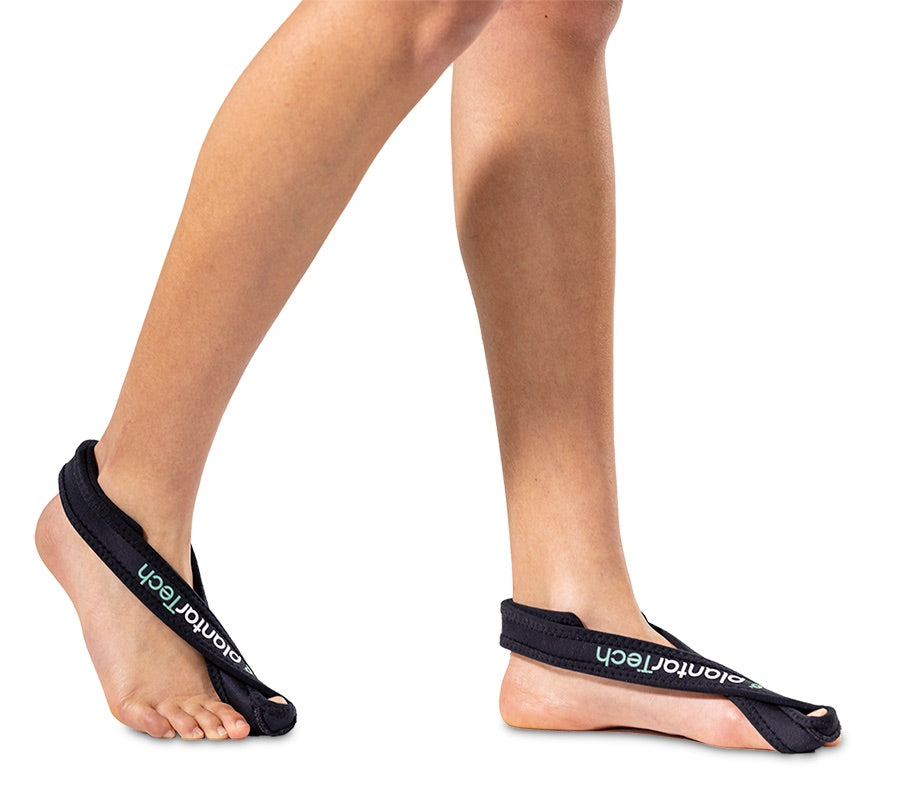
Your Guide to Managing Plantar Fasciitis Pain
Good news.
Symptoms associated with plantar fasciitis typically last about two to four months. Ninety percent of people report resolution of symptoms within one year. For a deeper dive into how PlantarTech works, check out our How it Works section.
Doctor designed.
“I was inspired to create the PlantarTech Strap after suffering from plantar fasciitis myself. Traditional boots and splints were just too cumbersome to wear, and I wanted a low-profile, ergonomical alternative to night splinting.” – Dr. Derek Amanatullah
For more information about Dr. Amanatullah, visit our Meet the Doctor page.
What does the data show?
The following provides general background on various approaches that are commonly used to manage plantar fasciitis. You should talk with your doctor if you have any questions about what approaches are best to help you manage your own plantar fasciitis.
Plantar Fasciitis By the Numbers
-
10-15%
Plantar fasciitis is the most common cause of heel pain. It accounts for 10-15% of all adult foot symptoms presenting to healthcare providers.
-
40-70
Plantar fasciitis is slightly more common in women than men. Those at greatest risk are between the ages of 40 and 70.
-
65%
Interestingly, 65% of the time plantar fasciitis is not associated with participation in sports.
Q&A with Dr. Derek Amanatullah
What causes plantar fasciitis?
“Micro-damage from inflammation, trauma, or repetitive stress can cause plantar fasciitis.”
How do I know if I have plantar fasciitis?
“A sign that you might have plantar fasciitis is if you have pain in your heel with your first step out of bed in the morning.”
How long does it take for plantar fasciitis to heal?
“With conservative treatment, plantar fasciitis symptoms typically last between 2-4 months.”
What are some of the best treatment options for plantar fasciitis?
“Night splinting, daily stretching, and supportive footwear are the best treatment options for plantar fasciitis. The reason each of these treatments often fail is because they are easy for your doctor to recommend, but hard to do in real life. Let’s face it, traditional night splints are not attractive or comfortable. The PlantarTech strap offers a practical, low-profile, sleek alternative to night splints.”
Recent Articles
View all-

5 Ways the PlantarTech Strap Makes Life Easier ...
For anyone who struggles or has struggled with plantar fasciitis, you know that the condition doesn’t start and end with heel pain — it affects almost every aspect of your...
5 Ways the PlantarTech Strap Makes Life Easier ...
For anyone who struggles or has struggled with plantar fasciitis, you know that the condition doesn’t start and end with heel pain — it affects almost every aspect of your...
-

These 4 Bad Habits Are Worsening Your Plantar F...
If you’ve ever experienced a sharp, stabbing pain in your heel that is at its worst in your first steps of the morning, you are most likely suffering from plantar...
These 4 Bad Habits Are Worsening Your Plantar F...
If you’ve ever experienced a sharp, stabbing pain in your heel that is at its worst in your first steps of the morning, you are most likely suffering from plantar...
-

3 Benefits of Treating Plantar Fasciitis with a...
If you suffer from plantar fasciitis heel pain, you’ve probably tried common remedies like pain relief medication, shoe inserts, stretching and exercises, walking boots, and perhaps injections. Depending on the...
3 Benefits of Treating Plantar Fasciitis with a...
If you suffer from plantar fasciitis heel pain, you’ve probably tried common remedies like pain relief medication, shoe inserts, stretching and exercises, walking boots, and perhaps injections. Depending on the...



